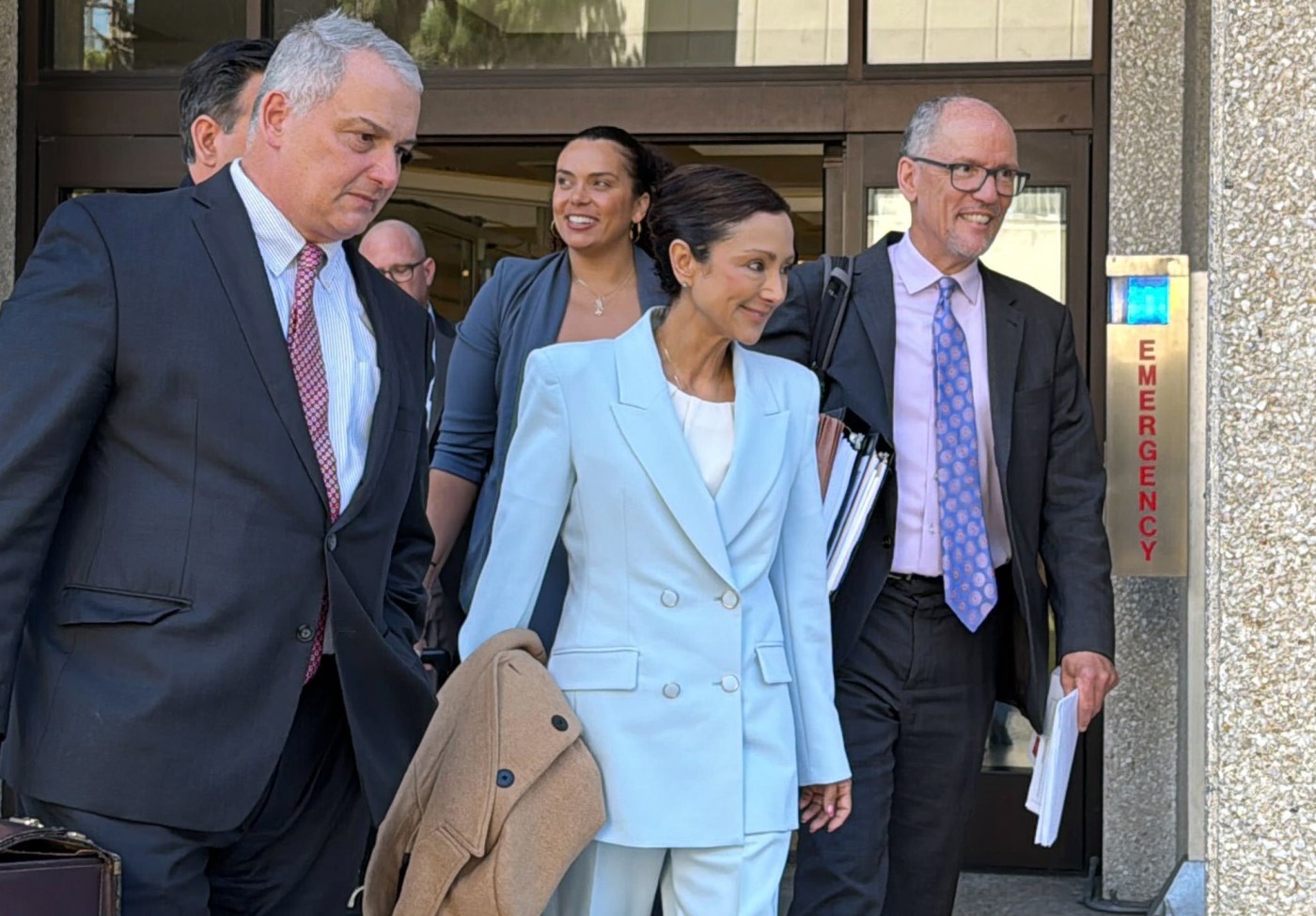
Fighting to keep her job, San Mateo County Sheriff Christina Corpus this week described how she had been plagued by misogyny and sexism amid a male-dominated law enforcement culture in her office even as efforts to remove her derailed her reforms.
Corpus concluded her testimony under oath Wednesday, after a full day on the stand Tuesday, in a public hearing that could lead to her removal from office. County lawyers, pursuing her ouster, sought to show through witness testimony that she retaliated against critics and had an inappropriate relationship with her former chief of staff, Victor Aenlle.
The case against Corpus began nearly a year ago, when two sheriff’s unions raised allegations of corruption, workplace misconduct, bullying and an inappropriate relationship between the county’s first Latina sheriff and Aenlle, including claims she sought to approve a salary for him — between $192,000 and $246,000 — that he was unqualified to receive.
Corpus and her legal team have denied the allegations.
The county hearing follows Corpus’ appeal of the Board of Supervisors’ decision in June to remove her under the voter-approved Measure A, which gave the board authority last March to remove an elected sheriff by until 2028, the end of Corpus’ term. Measure A made San Mateo the first Bay Area county to grant such authority. Corpus also faces a separate removal process through a civil grand jury accusation filed in June.
Much of the fourth day of testimony on Thursday focused for hours on payroll and overtime discrepancies tied to San Mateo County Deputy Sheriff’s Association President Carlos Tapia, who was arrested in November 2024 on suspicion of fraud, the same day a scathing 400-page report by retired Judge LaDoris Cordell was released, outlining evidence supporting many of the allegations against Corpus.
Based on documents presented by county lawyers, Tapia was under investigation for allegedly claiming between $25,000 and $50,000 in fraudulent overtime from January to October 2024. Last year, San Mateo County District Attorney Stephen Wagstaffe declined to charge Tapia, clearing him of wrongdoing.
County attorneys argued Tapia was unfairly targeted for publicly criticizing Corpus and that the alleged discrepancies were clerical errors.
Corpus’ defense team countered that the union leader’s arrest was justified, asserting that his coding of overtime and double-time while conducting union business was intentional, not a clerical mistake. They also noted that the accusations stem from her efforts to end double-overtime pay after 9 hours of overtime a week, which she says amounts to millions of dollars annually from the sheriff’s budget.
Tapia’s former supervisor, Lt. Brandon Hensel, testified that miscoding was likely an unintentional error, but after cross-examination from Corpus’ lawyers, said he would not have approved dozens of timecards that combined union business with overtime.
Payroll coordinator Van Enriquez said county systems can sometimes glitch after overtime is approved.
Jennifer Valdez, a former aide to Aenlle, was among several former colleagues who had once been close to Corpus but testified against her during this week’s removal hearing.
Valdez testified that she once overheard Aenlle say “te amo (I love you)” to the sheriff during a phone call. County attorneys have used her account to support claims that Corpus blurred personal and professional boundaries and allowed Aenlle to wield unusual influence in the office.
Valdez also said she discovered Aenlle still had access to a gun safe after being forced out.
“It was shady to me,” Valdez testified. She said she immediately reported the discovery to her supervisor and the County Attorney’s Office before resigning.
According to an internal memo, Aenlle instructed Undersheriff Dan Perea to change the code to a safe that Aenlle claimed held three rifles.
“This is how they are going to get me,” Aenlle allegedly told Perea.
Perea wrote that he refused to change the code and documented the interaction that day, noting a “San Mateo County investigation which included information related to these rifles.”
The removal hearing for Corpus, held in the San Mateo County Superior Court in Redwood City, drew limited public attendance on the fourth day, with less than half the gallery filled. Proceedings are scheduled to last two weeks, with the county presenting its case first over five days, followed by the defense. Retired Judge James Emerson is serving as the independent hearing officer.
Corpus’ team has framed the case as a fight over reform and addressing entrenched sexism in the sheriff’s office.
On the first two days of the hearing, attorneys for the county, represented by San Francisco law firm Keker, Van Nest, & Peters, sought to portray Corpus as a vindictive leader who retaliated against critics and blurred lines between her professional duties and personal relationships.
Her defense team includes several lawyers from the San Francisco law firm Murphy, Pearson & Bradley, along with the recent addition of Democratic heavyweight Tom Perez — a former U.S. labor secretary under President Barack Obama and senior White House adviser to President Joe Biden.
Following the conclusion of the hearing, Emerson has 45 days to submit a recommendation. The board then has 30 days to review the opinion before voting in a public meeting. A four-fifths vote is required to oust the sheriff, which would make Corpus the first elected sheriff in California removed through this process. Under the county charter, supervisors would then have 30 days to either appoint a new sheriff or call a special election. If they fail to act, the elections office must immediately schedule an election, meaning a final outcome may not arrive until November or December.